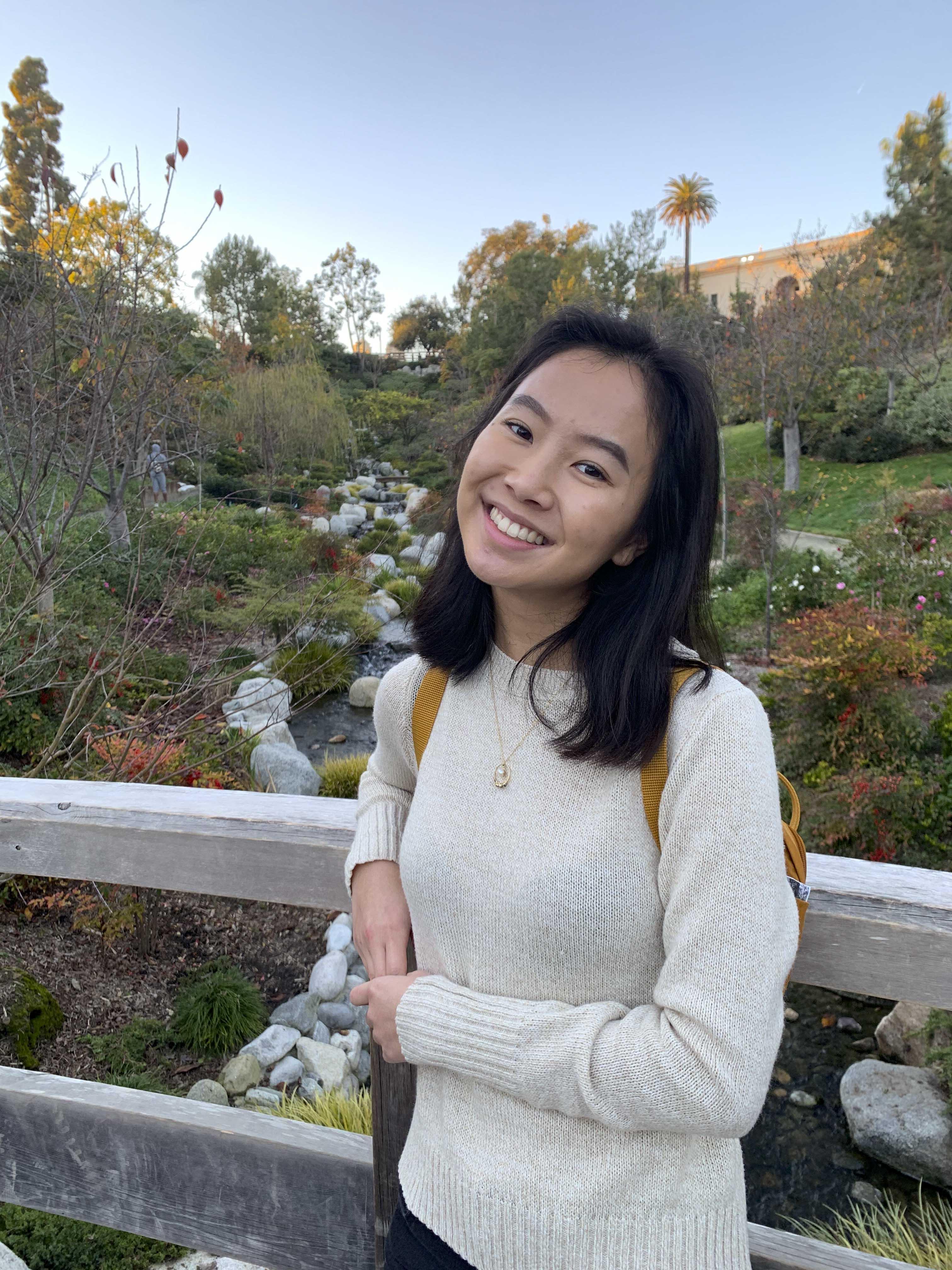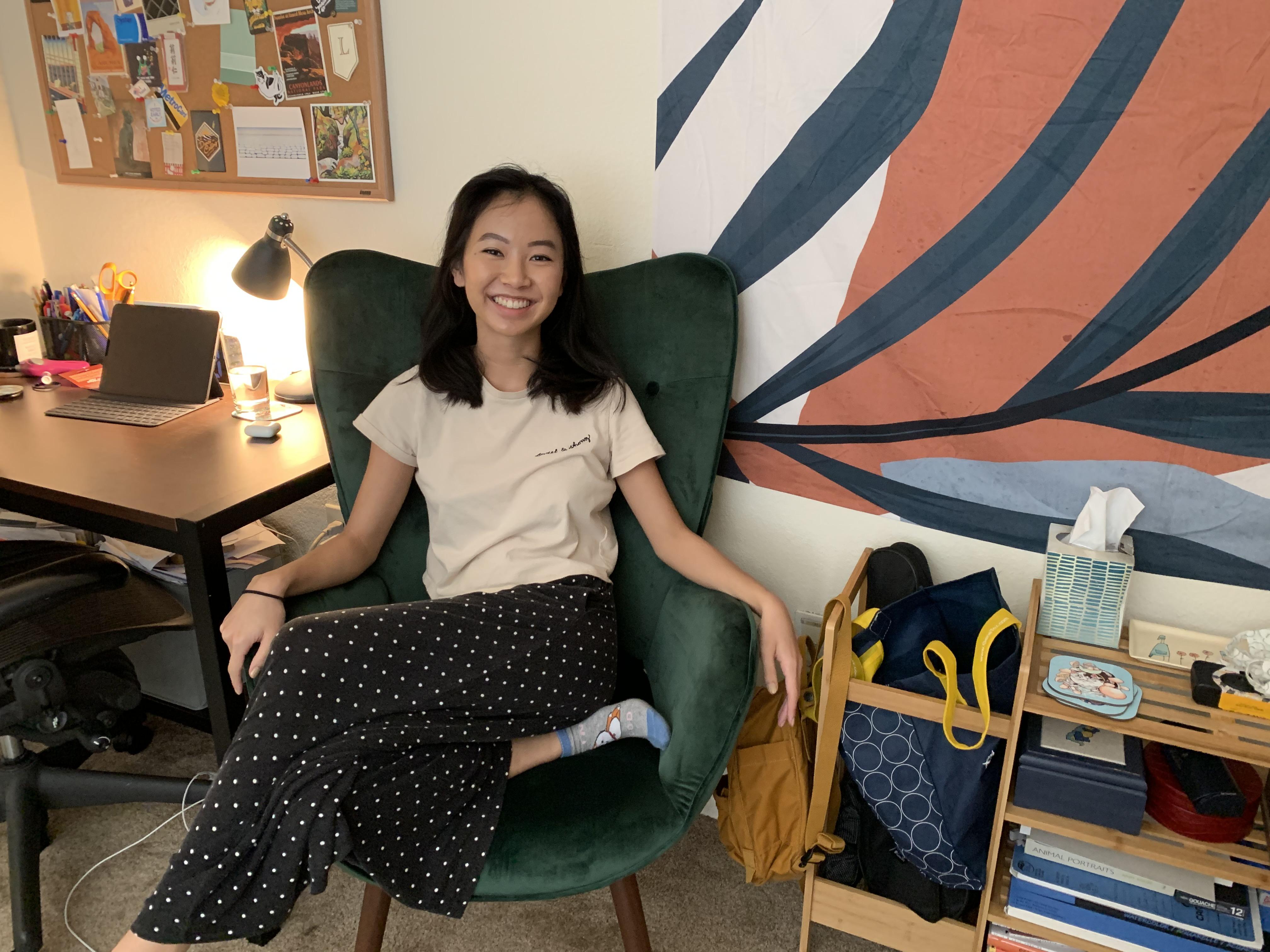Lillian Delacruz (MCB '21) was one of MCB's 2020 Margaret Bilson Scholarship awards winners. 
Lillian shared a bit about what the award means to her, why she is passionate about science and how her studies and research have been impacted by the COVID19 pandemic.
What does this award mean to you? Why is it meaningful?
Margaret Bilson was passionate about biology which makes the scholarship more meaningful and makes me feel connected to her. I was raised with the image of a male scientist; that she is a female scientist resonated with me! I was surprised when I was notified that I won this scholarship. It makes me really happy because it's a challenging time right now. I'm concerned about having enough funds for myself and my family. I want to make sure they have access to food, medicine and supplies they need.
Why Science?
My passion for science started with pure curiosity. As a child, I would catch bugs and look at Wikipedia pages on butterflies. I watched documentaries with my father. A lot of my interest was self-directed curiosity; I wanted to understand how things integrate. It was romantic to me to understand more than what is just on the surface. I always did well in science courses. In high school, I took anatomy and physiology class and I was very good at memorizing and I loved learning the details about the human body and how it functions.
Why did you choose the University of Arizona?
As a native Arizonan, I knew I would choose a university in this state. I also knew the University of Arizona is a good research institution, with the respected College of Science and a beautiful campus!
Why did you choose MCB as a major?
MCB is specific and detailed on the molecular processes underlying biology. MCB provides a really great basis for any biology discipline. I know with a B.S. in MCB, I can pivot to any discipline with this strong foundation for anything I want to do.
What was your interest in working in the Mosquito Lab?
I wrote a ten-page paper on mosquitos for a high school paper. I was accepted in UBRP program (Undergraduate Biology Research Program) the summer of 2017 and looked at mosquito labs and found the Riehle lab. I thought what they were doing was interesting. Dr. Riehle was kind and interesting and I really wanted to be a part of the lab. Mosquitos are kind of quirky and I thought it was interesting!
Due to COVID-19, research in the lab came to a halt, but I still read papers and keep up on literature. The insectary is still going with a few people! In my research, I was still optimizing - I was doing western blots (protein analysis) and the antibodies I needed were delayed in shipping, so I did not get to finish that part of my research.
This summer, I am in the MARC program (Maximizing Access to Research Careers) and I am going to participate in the MIT summer program remotely. I will be working with Dr. Mary Ellen Wiltrout on virtual course development and data analysis. Additionally, I am in correspondence with Dr. Matthew Vander Heiden's lab, which was the lab I was initially placed to work in before the pandemic. I am zooming into their lab meetings and journal clubs to learn more about cancer biology. I hope to develop an NSF-GRFP with Dr. Vander Heiden's lab. Alongside MIT this summer, I will continue delving into relevant mosquito and malaria literature for Dr. Riehle's lab.
 How has coronavirus impacted you?
How has coronavirus impacted you?
This virus is the one collective thing we can relate to each other on and are all struggling with. We are all more compassionate towards one another. People are much kinder to each other, on social media, making masks, sheltering more animals, people are donating, getting groceries for each other. It seems very wholesome during a really scary time. We're in an election year when everything is stressful and it's nice to see the compassion and humanity. Everything is so much more polarized and a virus is bipartisan. We're all in it together!
Like many others I found it hard to find internal motivation to do my work. My personal living and academic spaces are now the same. We've engineered the living room in my home to be like coffee shop. We play coffee shop music and we have my bike sitting there; it gives the coffee shop vibe - like many Tucson coffee shops! After the 3rd week I was able to get more focused. I did not opt for pass/ fail option for any of my classes because I wanted to say motivated and I was able to achieve a 4.0 GPA this semester!
What MCB classes have you like most and why?
MCB 325 - The Biology of Cancer; it relates to my love for drawing and I loved the diagrams! I loved writing notes from that class and making my notes pretty and interesting. I'm really proud of my notes!
What skill have you learned that you think will be most useful when you graduate?
Time management and being able to use Google calendar! I never had to use a planner before college because I could remember everything. It's so much more involved now and it's impossible to remember every single thing I have to do. I set reminders to get things done sooner rather than later which helps to keep me from procrastinating! I sometimes trick myself and set the exam for a week earlier. I try to engineer my life to be early.
What are your plans post-graduation?
I would like to pursue a Fulbright during a PhD program and I eventually want to be a PI and professor.
I want to do science outreach and art, maybe write and illustrate children's books to create accessible science. I’d like to do something that resonates with public. Science publications aren't written for general public and I want to make science accessible and reinforce the important of science and why it matters.
What would you say to a high school student considering UA and a science major?
I can resonate with imposter syndrome! College is difficult and people seem like they all know what they are doing but take solace in that everyone else is figuring it out! At the University you can be interdisciplinary and study humanities, art, whatever. You have the opportunity to be diverse and not have one definite major. As a first year student there are so many opportunities to make sure you belong. I was in ASEMS (Arizona Science, Engineering and Math Scholars Program) which helps underrepresented students navigate their way, how to study, how to talk to professors. They really want to help! Everyone wants the students to be the best they can.
I was in Dr. Tax's lab as a freshman and learned it's OK to not know and to ask questions! Research isn't just an unpaid internship here. There are financial opportunities to do research. One of the great things about MCB is the diversity of faculty. MCB fosters inclusivity and our faculty are representative of that.
What drew you to a minor in Religious studies as a minor?
I took intro to World Religions as a freshman and it forced me to consider new perspectives, how to have understanding and be empathetic and compassionate. It's important in research to not just be analytical; you need to also understand the people your research is aimed at helping. For example, if you are studying malaria, this occurs mostly in third world countries so it’s good to understand these cultures. Scientists need to consider socioeconomic status when studying and doing research and they need to understand the full ramifications of their research. I believe a minor in Religious Studies creates more compassionate understanding of who my research impacts.
What are your hobbies and interests outside school?
I like to do art! As child I would stay in my room and paint. I enjoy art and enjoy having a finished product at the end. Cooking is also very enjoyable. And I really love cats! I volunteer at a cat shelter here. I also started a Parks and Recreation Show IG account (@parks.n.rec) and has almost 90k followers!





